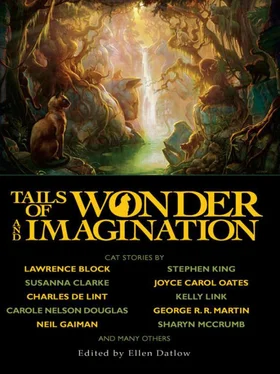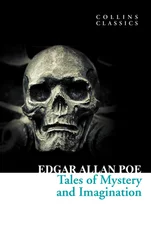Ellen Datlow - Tails of Wonder and Imagination
Здесь есть возможность читать онлайн «Ellen Datlow - Tails of Wonder and Imagination» весь текст электронной книги совершенно бесплатно (целиком полную версию без сокращений). В некоторых случаях можно слушать аудио, скачать через торрент в формате fb2 и присутствует краткое содержание. Год выпуска: 2010, ISBN: 2010, Издательство: Night Shade Books, Жанр: Фэнтези, Фантастика и фэнтези, Ужасы и Мистика, на английском языке. Описание произведения, (предисловие) а так же отзывы посетителей доступны на портале библиотеки ЛибКат.
- Название:Tails of Wonder and Imagination
- Автор:
- Издательство:Night Shade Books
- Жанр:
- Год:2010
- ISBN:978-1-59780-170-6
- Рейтинг книги:5 / 5. Голосов: 1
-
Избранное:Добавить в избранное
- Отзывы:
-
Ваша оценка:
- 100
- 1
- 2
- 3
- 4
- 5
Tails of Wonder and Imagination: краткое содержание, описание и аннотация
Предлагаем к чтению аннотацию, описание, краткое содержание или предисловие (зависит от того, что написал сам автор книги «Tails of Wonder and Imagination»). Если вы не нашли необходимую информацию о книге — напишите в комментариях, мы постараемся отыскать её.
collects the best of the last thirty years of science fiction and fantasy stories about cats from an all-star list of contributors.
Tails of Wonder and Imagination — читать онлайн бесплатно полную книгу (весь текст) целиком
Ниже представлен текст книги, разбитый по страницам. Система сохранения места последней прочитанной страницы, позволяет с удобством читать онлайн бесплатно книгу «Tails of Wonder and Imagination», без необходимости каждый раз заново искать на чём Вы остановились. Поставьте закладку, и сможете в любой момент перейти на страницу, на которой закончили чтение.
Интервал:
Закладка:
As he retched and tumbled forwards out of the concealing forest, he knew this was a story to which he would never append his byline: firstly, because he wasn’t going to get out alive, and secondly, even if he did, the trauma would never allow him to relive these moments.
Two youths pounced on him, jabbering excitedly in Swahili. A third youth darted into the forest in search of any accomplices.
As the youths bound his ankles, Craig watched the tall man gulp down the German girl’s blood. He drank so eagerly and with such vigorous relish, it was possible to believe he completely voided her body of all nine pints. His cheeks had coloured up and Craig thought he could see a change in the man’s body. It had filled out, the mosquitoes that clung to him no longer covered quite so much of his grey-white nakedness.
He wondered when his own turn would come. Would the tall man save up his victims, drink them dry one a day, or would he binge? Already, he had turned to Alison, swinging from her bonds as she tried desperately to free herself. She was a fighter. Karin sobbed uncontrollably alongside, and Lief was wherever he had gone to while they were all still on the boat. As Craig was hoisted upside down and secured by one of the youths, he thought to himself it would be preferable to go first. As if sensing his silent plea, the tall man twisted around to consider the attractions of his body over the girl’s.
Popo’s approach was swift and silent. The first any of those present knew of it was an abrupt cacophony: the crashing of bodies through dry vegetation, the deep-throated growling of hungry beasts, the concerted yells and screeches of our rescuers. Visually I was aware of a black and gold blur, flashing ivory teeth and ropes of saliva swinging from heavy jaws as the leopards leapt.
Popo saved my life at that point—the exact moment at which the old Craig died. It was necessary, if I were to survive. The hard-nosed journalist was as dead as the corpses swinging in the breeze higher up in the tree. He would not write up this story, I would—but not for a long time, and not for the newspapers. It’s history now, become legend, myth—just as it had always been to Popo and the men of Jozani.
Those who survived it—and they are few—speak of it rarely. Lief lives quietly, on his own, in a house by the sea in his native Denmark. Karin, his former girlfriend, has returned to Africa as an aid worker. Most recently she has been in eastern Zaire: I saw her interviewed on the TV news during the refugee crisis. I have no contact with either of them. Alison and I tried to remain in touch—a couple of letters exchanged and we met once, in a bar in the West End, but the lights and the noise upset us both and we soon parted. I have no idea where she is now or what she is doing.
I left my reporter’s job on medical advice and spent some time fell-walking in South Wales until I felt well enough to return to work, but on the production side this time. I never have to read the copy or look at the pictures—just make sure the words are on the page and the colours are right.
I go to Regent’s Park Zoo every so often to look at the leopards. Watching them prowl around their cages reminds me of the moment in my life when I was most alive—when I saw, with an almost photographic clarity, one of Popo’s leopards take a swipe with its heavy paw at the bloodsucking creature’s midriff. There was an explosion, a shower of blood, Anna’s blood. His skin flapped uselessly, transparently, like that of the mosquito I had swatted against my arm on the terrace of the Africa House Hotel.
Popo and his men—witch doctors or Jozani Forest guides, I never found out—untied us and lowered us safely to the ground. Later that evening, after the police had been called and started the clear-up operation, Popo himself took me back to Zanzibar Town in his Suzuki. On the outskirts of town he brought the vehicle to a sudden halt, flapping his hand about his head as if trying to beat off an invisible foe.
“What’s up?” I asked, leaning towards him.
“Mbo,” he muttered.
I heard a high-pitched whine as it passed by my ear. I too lashed out angrily.
“Mosquito?” I asked.
“Mbo,” he nodded.
It turned out I had got the little sod, despite my flailing attack. Maybe it was just stunned, but it lay in the palm of my hand. I was relieved to see that its body was empty of blood.
“We call it mosquito,” I said and I shivered as I wondered if we had brought it from the forest on our clothes.
For months later, I would discover mosquitoes, no more than half a dozen or so, among the clothes I had brought back from Zanzibar. So far, they have all been dead ones.
BEAN BAG CATS ®
Edward Bryant
Edward Bryant began writing professionally in 1968 and has had more than a dozen books published, including Among the Dead , Cinnabar , Phoenix Without Ashes (with Harlan Ellison), Wyoming Sun , Particle Theory , Fetish (a novella chapbook), and The Baku: Tales of the Nuclear Age . He originally made a name for himself as an award-winning science fiction writer but in the mid-1980s he strayed into horror, where he produced a series of sharply etched stories about Angie Black, a contemporary witch, the brilliant zombie story “A Sad Last Love at the Diner of the Damned,” and other marvelous tales. But he’s never completely given up writing science fiction.
“Bean Bag Cats ®,” commissioned by me for OMNI Magazine in 1983, is a little of both.
FROM: John J. Finnegan, President
Wake & Finnegan
Marketing Division
TO: David Brooks, Head Copywriter, Creative Projects Department
Okay, son. Where is it? Life Pro Labs is getting a little antsy. They’re laying out more cash for this campaign than you know. Show me something rough.
FROM: Brooks
TO: Finnegan
You want it, Boss. It’s yours. It ain’t been easy trying to figure how to sell a pussy that looks like a strudel. Notes follow:
A significant portion of the Bean Bag Cat campaign will obviously be oriented toward urban consumers. A genetically modified, nonambulatory pet will be very attractive to apartment, co-op, and condominium dwellers.
Imagine the numerous possibilities for utilizing what is essentially a live cat without paws or legs. Standard accessory packs should include Velcro grip strips so that the Bean Bag Cat can be placed securely on a sofa arm, chair seat, or any other surface in a limited living space.
Models will initially include the ten most popular feline breeds. BBCs will be available either in kitten or adult format, although the kittens will be hormonally arrested so that they will stay cute for an indefinite product span.
Item: Life Pro Labs says they’ll have the growth-curve problem licked in a year or so, and then we’ll be able to offer a BBC that the consumer can obtain as a kitten and then be able to watch grow into adulthood in a matter of weeks.
They’ll simply have to change the SaniKit attachments. These can be marketed separately as an educational experience for children, emphasizing the lesson of pet care responsibility.
About the SaniKits. Since prospective consumers will obviously realize that the BBC won’t be able to get to a sandbox on its own—or at least not at any practicable speed—the campaign will have to mention the SaniKit bags that the pet owner will be obliged to change at a maximum of three-day intervals.
There must be a marketable way to warn owners that failure to observe the maintenance schedule in the Bean Bag Cat will result minimally in feline renal dysfunction, maximally in cat all over the living room. Perhaps research and development can come up with an audible warning such as the low-battery indicator in home smoke alarms. Call them SaniKat Kits, and Life Pro Labs can look forward to a lucrative accessory trade.
Читать дальшеИнтервал:
Закладка:
Похожие книги на «Tails of Wonder and Imagination»
Представляем Вашему вниманию похожие книги на «Tails of Wonder and Imagination» списком для выбора. Мы отобрали схожую по названию и смыслу литературу в надежде предоставить читателям больше вариантов отыскать новые, интересные, ещё непрочитанные произведения.
Обсуждение, отзывы о книге «Tails of Wonder and Imagination» и просто собственные мнения читателей. Оставьте ваши комментарии, напишите, что Вы думаете о произведении, его смысле или главных героях. Укажите что конкретно понравилось, а что нет, и почему Вы так считаете.












